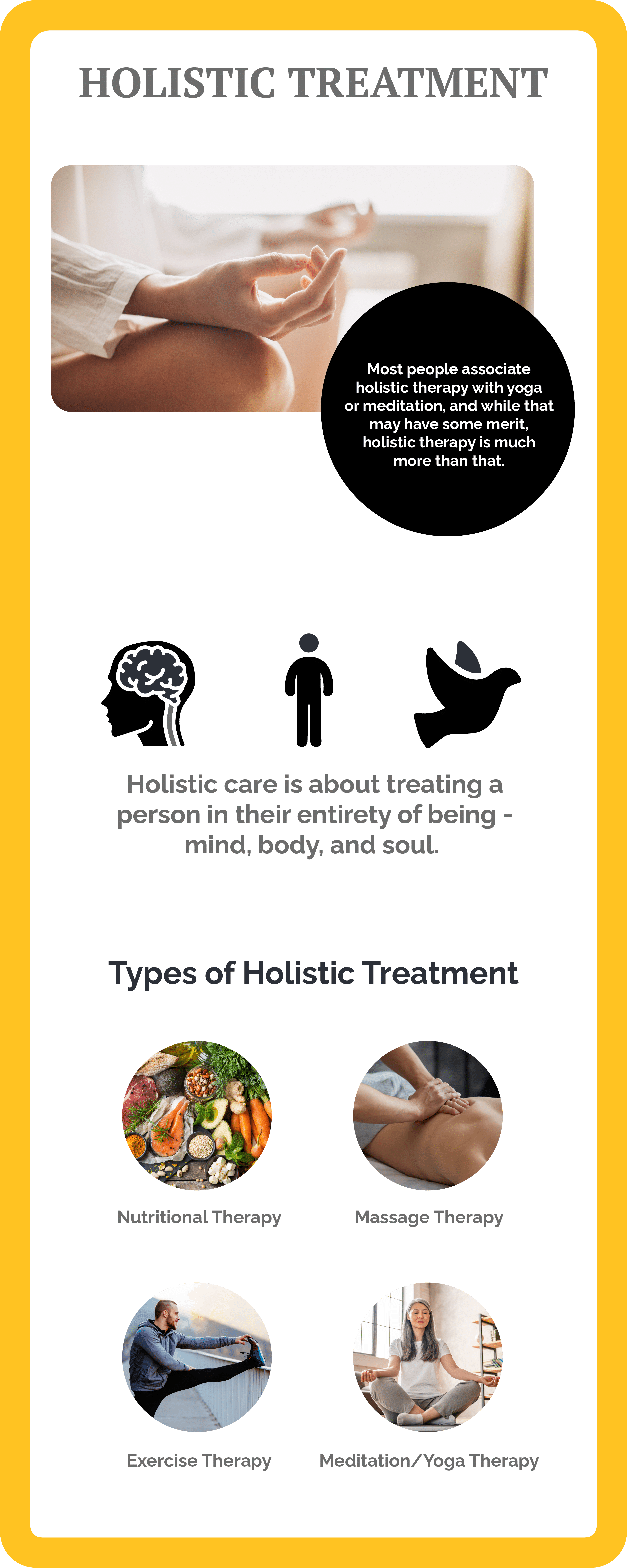“Holistic” is a term most people associate with alternative health practices, such as yoga or meditation. Such practices are indeed elements of holistic therapy. However, the term means to treat the entire body and mind rather than focusing on a specific issue.

Holistic rehab Florida centers use a variety of techniques, exercises, and nutritional interventions to help recovering addicts. By focusing on overall health, residents at the treatment centers have the best shot at staying clean and enjoying happy lives.
Miracles Recovery Center offers treatment services to help those suffering from addiction and mental health issues, learn the resources and life skills they need to effectively cope with their conditions.
Table of Contents
Holistic Rehab Center Florida: Healing the Body and Mind

These days, many Florida addiction treatment centers offer holistic therapy. As researchers continue documenting the benefits of mindfulness, exercise, and other such practices, more drug rehab centers are utilizing them.
In the past, substance abuse treatment programs used to focus mostly on the body. Patients would undergo detox, return to the world, and attempt to maintain sobriety. Unfortunately, without proper healing, that was often impossible.A variety of factors can drive a person into addiction. For example, one might be vulnerable to addiction because they suffer from low self-esteem. If that’s the case, low self-esteem will still be an issue when that person sobers up. If, however, the person works on their self-esteem at a holistic rehab Florida center, they will likely return to everyday life feeling stronger and better than before
The Forms of Holistic Therapy: Fighting Addiction from All Angles
Spiritual Guidance Therapy
A big aspect of holistic addiction treatment programs at rehab is catering the exercises and practices to the individual. Not every resident is a spiritual person, but those who are will benefit from spiritual guidance during this time.
At holistic Florida rehab centers, residents explore religion and spirituality in a variety of ways. One of the most common is through the 12-step program. Faith is a crucial aspect of the program, which focuses on faith in a general higher power rather than the God of a specific religion. This makes the program an excellent option for those with agnostic or open-minded beliefs.
Another way residents can explore spirituality is with the help of a counselor or group therapy sessions. Spiritual-based rehab programs often host group sessions where residents can discuss spiritual topics. Surrounding oneself with like-minded thinkers who are struggling with the same problems is a great way to enjoy mutual support.
Yoga
Yoga is an ancient spiritual and physical practice that uses a sequence of postures to connect the breath with the body and mind. The practice, which is done regularly by an estimated 21 million Americans, offers many benefits. Everyone can benefit from yoga whether they’re in recovery or not.
The benefits of yoga include:
- Relieving stress.
- Improving sleep quality.
- Reducing pain.
- Increasing strength and stamina.
- Creating a mindful state.
- Boosting energy levels.
- Improved confidence.
- Providing the opportunity for self-reflection.
- Encouraging deep breathing.
Yoga is particularly helpful for those in recovery because it addresses many of the symptoms and conditions recovering addicts face. The practice calms the nervous system and helps with drug cravings and painful emotions that bubble to the surface during the recovery process.
Meditation
Much like yoga, meditation creates a state of mindfulness. It also promotes deep breathing and offers many other similar benefits. Aside from reducing stress, meditation helps a person with self-awareness. Becoming aware of one’s thoughts can help them develop a greater understanding of the triggers and underlying causes of their substance abuse.
A study from the University of Washington looked at 286 people who had completed a rehab program successfully. They randomly assigned them to one of three groups: a 12-step group, a meditation group, and a traditional program designed for relapse prevention. The meditation program was found to be the most effective.
Of course, there’s no reason a recovering addict must choose between meditation and these other options. Practices like meditation and yoga are excellent adjunct therapies, meaning they’re best used alongside traditional treatments. They are not intended to replace proper medical care.
Chiropractic Care
Chiropractic medicine focuses on the way musculoskeletal disorders and other mechanical issues with the body can affect general health. At holistic rehab Florida centers, chiropractic care is sometimes provided to help patients deal with physical imbalances.
Chronic pain can be a trigger for substance abuse. Those who suffer a back injury will often receive pain medication. Even if they follow their doctor’s instructions carefully, the risk of addiction is still there. The pain and the gradual onset of physical dependency create an ugly cycle, and most addicts can’t get out of it without help.
Since pain in the body can be a trigger, chiropractic care can provide relief. For some patients, receiving chiropractic treatment for misalignments of the spine or neck can be life-changing. Chiropractic care has been proven to help decrease cravings and even ease the symptoms of depression and anxiety.
Nutritional Counseling
Without the proper fuel, the human body can’t possibly thrive. While lost in addiction, most addicts fail to eat healthily. They may skip meals and become malnourished, or they may overindulge in unhealthy foods and gain weight. Opiate addicts and alcoholics often have calcium and magnesium deficiencies due to their poor diets.
Working with a nutritional counselor during the recovery process will help the patient learn how to feed themselves again properly. Nutritional counseling will also address any specific deficiencies the patient is dealing with. Nutritional supplements or dietary changes might be recommended to improve the situation.
Fitness
The benefits of exercise are well-documented. It can boost mood, improve physical health, and even help fight depression and anxiety. Therefore, it should come as no surprise that it’s beneficial for people in recovery.Research has shown exercise is yet another excellent adjunct therapy for holistic treatment center Florida patients. Studies on rodents have found that it can reduce opioid and cocaine cravings. A human study of 38 people who participated in group exercise found that the exercise reduced relapse rates. It even helped those who hadn’t quite reduce the frequency of their substance usage.

Life Skills
Recovery is about more than sobering up. A recovering addict must also take inventory of their life skills and determine what needs to be improved. Some people fall into addiction and then lose their life skills over time. Others start abusing substances because of their lack of life skills. For example, someone who doesn’t have the skills to get a proper job may become depressed at the lack of prospects and turn to substances for relief.
At a holistic treatment center in Florida, residents work on developing life skills. This work continues for most patients as they leave the center and move into a sober recovery house. Patients work on skills like assertiveness, organization, communication, and problem-solving. When patients are further into the recovery process, they may also benefit from career counseling.
Trauma Therapy
Past trauma is another common trigger for substance abuse. Trauma can cause lasting pain and difficulties when the patient suffers from post-traumatic stress syndrome (PTSD). This condition causes the patient to remain in a heightened state of stress and become triggered when sensory experiences remind them of what they went through.
It’s impossible to undo a traumatic experience, but that doesn’t mean the patient can’t heal. Coming to terms with what happened, making peace with it, and deciding to start a new chapter is crucial. Trauma therapy at a holistic rehab Florida center can provide the patient with coping strategies for triggers.
Cognitive Behavioral Therapy (CBT)
Cognitive-Behavioral Therapy (CBT) is a form of therapy that has been proven effective in helping people learn how to deter negative thoughts and emotions and change addictive behaviors that often worsen mental health. It can help with substance abuse, depression, anxiety, PTSD, eating disorders, and many other issues. It’s excellent for people in recovery, especially those who are dealing with a dual diagnosis.
Studies have found CBT to be as or even more effective than other types of psychological therapy. In some cases, it can even help as much as psychiatric medication.
The CBT theory explains that psychological problems are often the result of unhealthy thinking and learned patterns of behavior. The therapy helps the patient learn new thinking patterns and find relief.
Dialectical Behavioral Therapy (DBT)
Dialectical Behavioral Therapy (DBT) is an evidence-based therapy, which aims to teach people healthy ways of coping with stress, improving their relationships with others, and regulating their emotions and behaviors.
The focus of DBT is helping patients develop new skills to manage emotional and interpersonal conflict. The focus is on increasing mindfulness, tolerating distress, regulating and facing emotions, and increasing interpersonal effectiveness. Going through the treatment plan process at a holistic rehab center in Florida helps the patient develop assertiveness, self-respect, and wellness.
Holistic Rehab Florida: Change Your Life for the Better
Here at Miracles Recovery Center, which offer holistic drug rehab treatment methods and treatment options, we’re ready to provide each of our residents with the well-rounded treatment experience they deserve. Recovery can be daunting, but you or your loved one don’t have to go through it alone. Our holistic approach the Florida recovery program in Port St. Lucie can help with addiction recovery and improvement of the patient’s well-being during their recovery journey. Please contact us now for more information.
References:
- https://www.ncbi.nlm.nih.gov/pmc/articles/PMC5907295/
- https://drugfree.org/drug-and-alcohol-news/mindfulness-meditation-can-help-reduce-addiction-relapse-rates-study/
- https://torquerelease.com/wp-content/uploads/2018/08/54.pdf
- https://www.health.harvard.edu/blog/can-exercise-help-conquer-addiction-2018122615641
- https://www.apa.org/ptsd-guideline/patients-and-families/cognitive-behavioral

